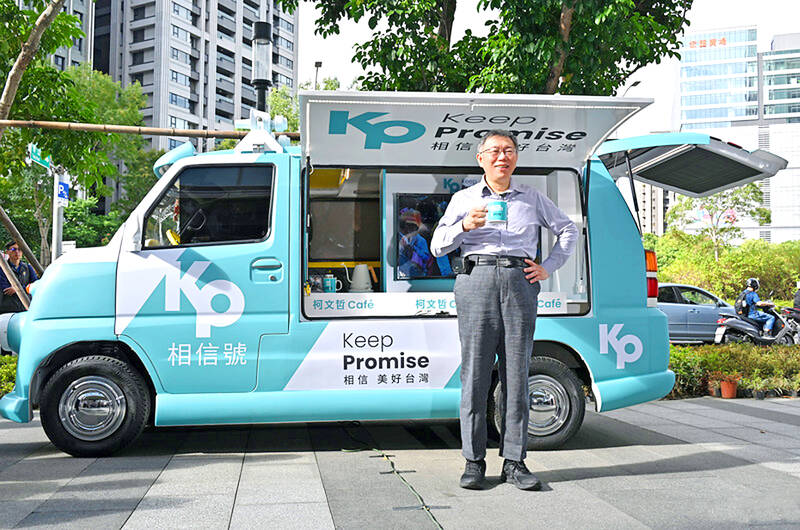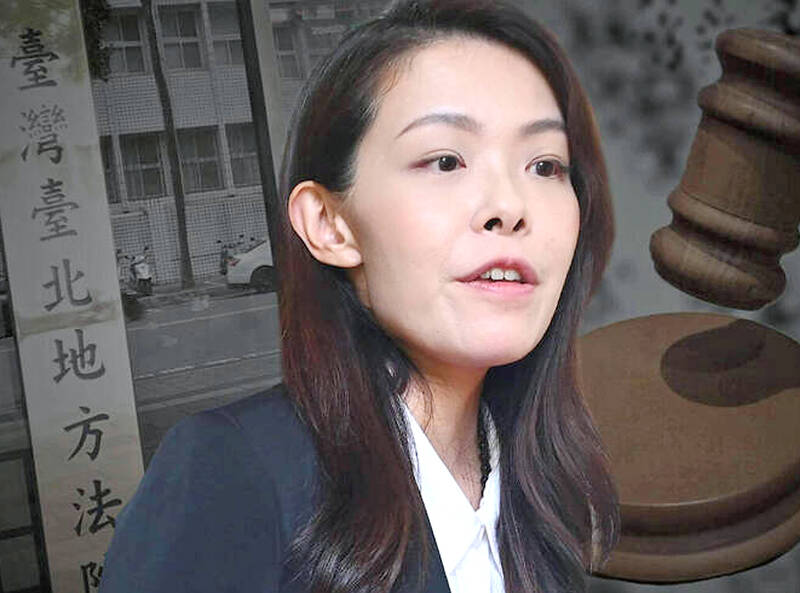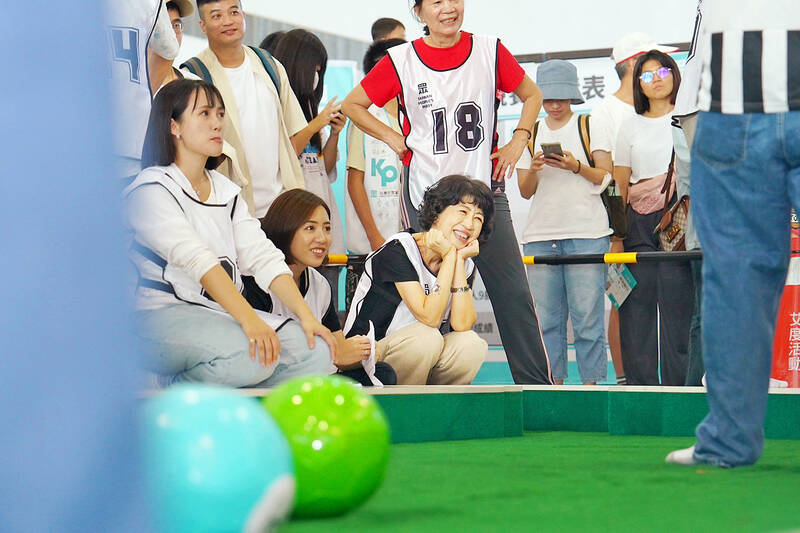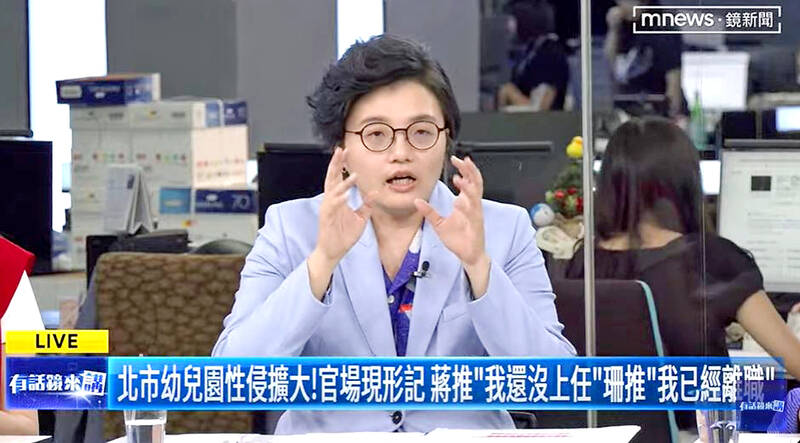This is the summer of hell for the Taiwan People’s Party (TPP) and their leader Ko Wen-je (柯文哲). In just the last few weeks the party has imploded. The question now is if they will have any future as an electable party or not.
The first blow fell on July 26, when the party’s Hsinchu Mayor Ann Kao (高虹安) was convicted on corruption charges and sentenced to seven years and four months in prison and suspended as Hsinchu mayor. She left the TPP in disgrace.
Then starting on Aug. 8, in quick succession the party became embroiled in three new scandals. There is a term to describe the current status of these three scandals — Roshomon (羅生門), the name of a classic movie by the superb Japanese director Akira Kurosawa. In the movie different characters describe the murder of a samurai in a forest, but with each giving wildly different accounts. The scandals embroiled the TPP are like this, with various actors giving very different explanations for what is going on.

Photo: Wang Jung-hsiang, Taipei Times
Like Roshomon, the situation unfolding around Ko and the TPP is edge-of-the-seat, popcorn-munching material full of colorful characters, allegations and attacks, lies and contradictions, intrigue and revenge and a fight for the very life of the nation’s third-largest political party against some of the best trench-fighting political operatives and celebrity commentators out for blood. Also possibly, depending on who you believe, gross mismanagement, corruption, embezzlement and/or fraud.
REVENGE, AUG. 8
In April, Grace Woo (吳靜怡), formerly in charge of Ko’s LINE account as mayor of Taipei and in 2020 number 25 on the list of TPP party list candidates, lost her party rights for a year after repeatedly trashing the party in the media. Woo, with dramatic frizzy hair and a penchant for sharp suit jackets, did not change and finally on July 4 she was expelled from the party.

Photo: Taipei Times file photo
She was determined to get her revenge and on Aug. 6 — Ko’s birthday — she dropped the bombshell that many of the entries in the TPP’s financial filings were untrue and there were some very dodgy-looking transitions worth NT$9.16 million involving the party and marketing firm MuKo Public Relations Marketing Limited (木可行銷公關), accounting firm Jing Hua CPA (精華會計師事務所), OCT Entertainment Co (時樂) and Neo Creative Marketing Production Co (尼奧創意行銷).
The ties between these companies and the party were tight. Ko presidential campaign chief financial officer and former high school classmate Lee Wen-tsung (李文宗) is the brother of Lee Wen-chuan (李文娟), the director of MuKo, which also has their offices in the same Taiwan Glass Building that hosts the TPP. They also have the exclusive rights to sell Ko’s copyrighted “kp” campaign swag. Ko goes by the nickname “Ko P” (“Ko professor” from his teaching days) and during the campaign he used it to double for “keep promise” (yes, singular).
As we shall see, Woo was just getting started. She was soon joined by others doing their own research, most notably pan-blue internet celebrity Liu Yu (劉宇), who is more widely known as 4xCat (四叉貓), a scruffy, perpetually disheveled bear of a man fond of casual sweatshirts and ponchos.

Photo: Screen grab from Peggy Chen’s Facebook page
KO’S WIFE ADDS TO MAYHEM, AUG. 9
While the TPP was scrambling to investigate their own accounts, the next day Ko’s wife Peggy Chen (陳佩琪), an internet celebrity in her own right, publicly apologized for registering a company and opening a bank account in her son’s name. The company was for the purpose of opening a cafe on the ground floor of Taiwan Glass Building named after the nickname of the young followers of Ko during the presidential campaign, “little grass” (小草), which was symbolized by a cute little sprout suggesting new beginnings.
At the time, she was a director at a government-owned hospital and she almost certainly was trying to get around the legal limitation on people classified as civil servants registering businesses.

Photo: Screen grab from YouTube
Initially Ko tried to portray her as not having any ill intent. Then he changed his story to saying it was not strange that parents would help their son with NT$100,000 to register his own business. Chen did the same, changing her story to say it was her son who did the registering.
She also started to sound defiant and no longer apologetic and contradicted herself again by saying “what law have I broken?” — which is a good question. Depending on the media outlet or the expert reports consulted, she may — or may not — have actually broken the law.
Regardless of the legality, it was a public relations nightmare. Most headlines on the topic either rentou (人頭), a term referring to using another person’s name to open accounts with the assumption for illicit purposes implied, or simply the word for fraud.
SCAPEGOAT, AUG. 10-12
By Aug. 10, Ko was admitting there were “flaws” in the accounting and called for calm while the party held an internal investigation. Additionally, the party apologized for what it said had been mistakes made during accounting, adding that it would conduct a full check of the inventory data again and resubmit the correct data to the Control Yuan, in accordance with the regulations.
It came to light the next day that the money raised at a “KP Show” concert held by Ko on July 29 last year and was at the time billed as a creative way to fundraise was not listed in the accounts. The show was given to the aforementioned MuKo to organize, who then subcontracted the execution to also aforementioned Neo Creative.
TPP spokesperson Celina Wu (吳怡萱) admitted in a pre-recorded video that the profits had gone to the companies and claimed that had been made clear prior to the concert. No one seems to remember that having been made clear, though perhaps it was in the fine print somewhere.
Several key figures in the party on Aug. 12 held a press conference. In it, they failed to report or misdeclared 17 expenses from its latest presidential election campaign, totaling more than NT$18 million.
All of this was blamed on accountant Tuanmu Cheng (端木正), of the aforementioned Jing Hua CPA, who the party hired to declare its financial records. TPP spokesperson Vicky Chen (陳智菡) claimed that Tuanmu said that the items were left out because they were under a time crunch and that he arbitrarily claimed approximately NT$18.17 million in expenses to OCT, Neo Creative and MuKe without notifying the party’s campaign team.
Jing Hua issued a statement in Tuanmu’s name, saying that the auditing service provided by the accountant for Ko’s political donations was conducted lawfully.
“We believe the Control Yuan and the prosecutors’ office should investigate the evidence, clarify the truth and prove the accountant innocent,” the statement said.
To apologize, the presidential campaign chief financial officer Lee Wen-tsung stood up and gave a deep bow. However, the party was still putting the blame squarely on Tuanmu.
Faced with all the unwanted attention, Lee’s sister the same day announced MuKe had decided to “suspend operations immediately” and proceed with legal liquidation and said all remaining profits after liquidation will be donated to charity, fulfilling a pledge to supporters.
Ko claimed that no money had gone into anyone’s pockets. He also said he was shocked and felt betrayed, and suggested this showed the party’s inexperience at having only run their very first presidential campaign.
As we shall soon see, Ko is trying to cover for his own actions. Safeguards and oversight mechanisms were in place within the TPP, but he removed them. Why?
Where did that NT$18.17 million go? Why was the entirety of their financial records reside in one person? These are just some of the questions raised by the Aug. 11 events that were not properly addressed and were just waived away as mistakes by one allegedly incompetent accountant.
FOUR DAYS
These four days would have been a total nightmare for any political party, but things are about to get much, much worse as this fiasco unfolds.
Another scandal also broke loose on Aug. 12 when one of Ko’s vice mayors was taken into custody, questioned and barred from leaving the country over yet another alleged corruption case that took place while Ko was mayor. So, in just four days Woo blew open the financial irregularities and potential embezzlement case, Peggy Chen may or may not have admitted to separately committed fraud and a corruption investigation involving his administration is creeping closer to Ko.
Stick around for this series of columns as we watch these multiple series of catastrophes unfold. Stock up on popcorn, you are going to need it.
Donovan’s Deep Dives is a regular column by Courtney Donovan Smith (石東文) who writes in-depth analysis on everything about Taiwan’s political scene and geopolitics. Donovan is also the central Taiwan correspondent at ICRT FM100 Radio News, co-publisher of Compass Magazine, co-founder Taiwan Report (report.tw) and former chair of the Taichung American Chamber of Commerce. Follow him on X: @donovan_smith.

Jacques Poissant’s suffering stopped the day he asked his daughter if it would be “cowardly to ask to be helped to die.” The retired Canadian insurance adviser was 93, and “was wasting away” after a long battle with prostate cancer. “He no longer had any zest for life,” Josee Poissant said. Last year her mother made the same choice at 96 when she realized she would not be getting out of hospital. She died surrounded by her children and their partners listening to the music she loved. “She was at peace. She sang until she went to sleep.” Josee Poissant remembers it as a beautiful

Before the last section of the round-the-island railway was electrified, one old blue train still chugged back and forth between Pingtung County’s Fangliao (枋寮) and Taitung (台東) stations once a day. It was so slow, was so hot (it had no air conditioning) and covered such a short distance, that the low fare still failed to attract many riders. This relic of the past was finally retired when the South Link Line was fully electrified on Dec. 23, 2020. A wave of nostalgia surrounded the termination of the Ordinary Train service, as these train carriages had been in use for decades

Lori Sepich smoked for years and sometimes skipped taking her blood pressure medicine. But she never thought she’d have a heart attack. The possibility “just wasn’t registering with me,” said the 64-year-old from Memphis, Tennessee, who suffered two of them 13 years apart. She’s far from alone. More than 60 million women in the US live with cardiovascular disease, which includes heart disease as well as stroke, heart failure and atrial fibrillation. And despite the myth that heart attacks mostly strike men, women are vulnerable too. Overall in the US, 1 in 5 women dies of cardiovascular disease each year, 37,000 of them

March 2 to March 8 Gunfire rang out along the shore of the frontline island of Lieyu (烈嶼) on a foggy afternoon on March 7, 1987. By the time it was over, about 20 unarmed Vietnamese refugees — men, women, elderly and children — were dead. They were hastily buried, followed by decades of silence. Months later, opposition politicians and journalists tried to uncover what had happened, but conflicting accounts only deepened the confusion. One version suggested that government troops had mistakenly killed their own operatives attempting to return home from Vietnam. The military maintained that the